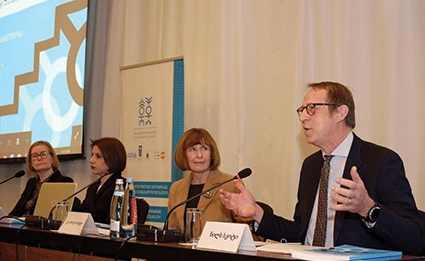Parliament Unveils Review of Gender Equality Legislation
The key findings of a comprehensive study, ‘Gender Equality in Georgia: Barriers and Recommen dations,’ carried out by the Gender Equality Council (GEC) of the Parliament of Georgia, were released on January 30 at a conference attended by representatives of the Georgian government, Parliament, civil society and international organizations.
The research analyzed nine fields of Georgia’s legislation for their compliance with principles of gender equality.
“This is the first attempt in Georgia to draw a comprehensive picture of gender equality challenges and offer specific recommendations to policymakers,” said Tamar Chugoshvili, First Vice Speaker and Chairperson of the Gender Equality Council of the Parliament of Georgia. “The study provides a roadmap for decision-makers and human rights defenders to identify further specific steps needed to close gender inequalities in Georgia.”
The study is based on interviews and data provided by the authorities, along with previous studies and reports undertaken in Georgia by national and international organizations. A team of researchers examined the nation’s international human rights obligations and top international practices to identify the gaps in legislation and policy, and to be able to offer concrete advice for the advance-ment of the gender equality agenda in a number of areas, including political participation, economic empowerment, violence against women, labor relation, health, education, sports, cultures, and peace and security.
Among the recommendations of the study are amendments to the Gender Equality Law, Anti-Discrimination Law, Criminal Code, Election Code, Labor Code and Law on the Public Defender. Policy recommendations are of particular importance to the closing of the gender gap in education, women’s economic advancement, protection of sexual and reproductive rights of women and girls, and advancing gender equality in sports and culture.
Key national agencies bearing responsibility for gender equality in Georgia are the targets of these recommendations and include the Gender Equality Council of the Parliament and the Inter-Agency Commission on Gender Equality, Violence against Women and Domestic Violence, which operates under the government.
“Legislation and policies alone are not enough to close gender gaps. However, their revision is a constructive step forward to achieving meaningful equality between women and men in all spheres of life as well as to prevent systemic discrimination against women,” said Niels Scott, Head of the United Nations in Georgia. “We hope that the findings and recommendations of this research will lay the ground for effective measures against sexual harassment, domestic violence and violence against women, as well as for increasing the political participation of women through temporary mandatory gender quotas.”
Following the presentation of the study, there was a discussion on the new Gender Equality Concept of Georgia. Based on the findings of the research, the new Concept (a revised version of the one adopted in 2006), was reviewed by experts from USAID/PROLoG. The Georgian Parliament is expected to adopt a new Concept for Gender Equality during the Spring 2018 session.
“The United States government is committed to supporting gender equality. Ending gender-based violence and sexual harassment, effectively fighting discrimination, and economically empowering women are priorities of the US government, and we are proud to support the Government of Geor-gia's efforts to reduce gender inequalities in Georgia through legislative reform and a modified State Concept,” said Elizabeth Rood, Deputy Chief of Mission at the US Embassy in Georgia.
The Gender Equality Council also presented its 2018-2020 Action Plan, revealing the key priorities of the gender equality agenda of the Parliament of Georgia. Their main objectives are the effective formation and management of the gender policy agenda; ensuring the merging of the efforts of va-rious interested parties or engaged parties; implementing women’s role-support initiatives. Their tasks include defining the main directions of state policy; improving the state mechanisms of gender equality; the creation and development of a legislative base in the field of gender equality; monito-ring of activities implemented for ensuring gender equality and developing recommendations; insti-tutional strengthening of the Gender Equality Council; and raising awareness.
In the legislative sphere, there is a need for reflection on the identified shortcomings and review of the gender equality law; advocacy for the introduction of special measures for women's political participation; preparation of a legislative package on women's economic strengthening; and work on legislative amendments to parental maternity leave.
The GEC’s efforts were supported by United Nations Development Program (UNDP), the Govern-ment of Sweden, under the UN Joint Program for Gender Equality, the United States Agency for International Development (USAID) and East-West Management Institute, under the USAID-funded initiative Promoting Rule of Law in Georgia (PROLoG).
The detailed study in its entirety is available on the UNDP Georgia Website.
Máté Földi












